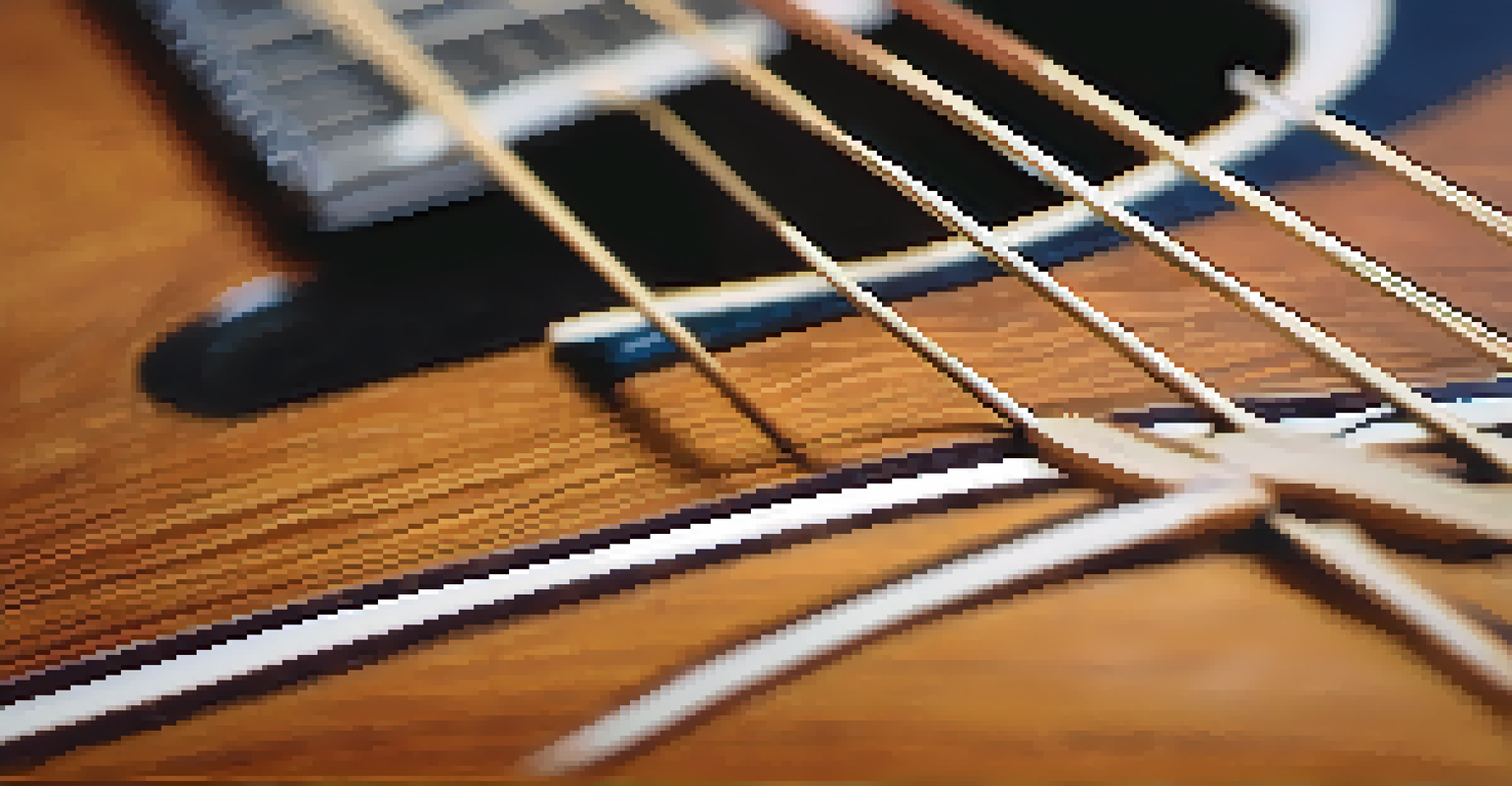The Role of Guitar Practice in Boosting Memory Retention

Understanding Memory Retention in Learning
Memory retention is the ability to keep information in mind over time. When learning something new, like playing the guitar, our brains actively encode and store this information. This process is crucial not just for musicians but for anyone looking to enhance their learning capabilities.
The more senses you engage in your learning, the more effectively you will remember.
Research shows that engaging multiple senses during learning can significantly boost memory retention. For instance, when you practice guitar, you're not just using your fingers; you're also listening to the notes, observing the fretboard, and thinking about the music theory behind the chords. This multi-sensory approach reinforces memory pathways more effectively than traditional study methods.
Moreover, practicing guitar requires repetition and consistency, key components for solidifying memories. Each time you practice a scale or a song, you're reinforcing those neural connections, making it easier to recall that information in the future.
How Guitar Practice Engages the Brain
Playing the guitar is a complex task that engages various areas of the brain. It combines motor skills, auditory processing, and even emotional responses, which makes it a unique learning experience. This brain engagement is crucial in enhancing overall cognitive functions, including memory.

For example, when you learn a new chord progression, you must memorize the finger placements while also recognizing the sound it produces. This dual-tasking trains your brain to create stronger associations between visual, auditory, and kinesthetic information, leading to better retention.
Multi-Sensory Learning Boosts Memory
Engaging multiple senses during guitar practice enhances memory retention by reinforcing neural pathways.
As you practice, your brain creates a mental map of the guitar, which not only helps you remember where to place your fingers but also aids in recalling songs and techniques. This comprehensive engagement is what makes guitar practice so effective for memory enhancement.
The Benefits of Repetition in Guitar Practice
Repetition is a fundamental principle in learning, and it's particularly powerful when it comes to mastering the guitar. Each time you repeat a chord or a melody, you're strengthening the neural pathways associated with that information. This means that over time, these actions become second nature.
Practice does not make perfect. Only perfect practice makes perfect.
Think about it this way: when you first learned to ride a bike, you likely fell a few times before you got the hang of it. The more you practiced, the more your body and brain adapted to the experience. Similarly, guitar practice involves repeated actions that lead to improved muscle memory and better retention of musical pieces.
Furthermore, this repetition not only helps in playing but also in recalling music theory and techniques. The more you engage in repetitive practice, the more information gets etched into your memory, making it easier to retrieve when needed.
Linking Emotions and Memory Through Music
Emotions play a vital role in memory retention, and music is a powerful emotional trigger. When you practice guitar, the emotions you feel while playing can create stronger memories associated with the music. For example, playing a heartfelt song can evoke feelings of nostalgia, making it easier to remember the song later.
Studies have shown that music can stimulate the release of dopamine, a neurotransmitter linked to pleasure and reward. This chemical reaction not only enhances your mood but also improves your ability to remember the music you play. So, when you practice guitar, you're not just honing your skills; you're also enhancing your memory through emotional engagement.
Repetition Solidifies Musical Skills
Consistent repetition in guitar practice strengthens neural connections, making playing actions second nature.
As you continue to play and connect emotionally with your music, those memories become more robust. This emotional connection can be particularly useful when learning complex pieces or memorizing lyrics, as the feelings associated with the music help reinforce those memories.
The Role of Focused Practice in Memory Enhancement
Focused practice, or deliberate practice, is crucial for maximizing memory retention. Instead of mindlessly repeating a song, focused practice involves setting specific goals and addressing challenges. This strategy is particularly effective in improving your guitar skills and memory.
For example, if you're struggling with a particular chord transition, dedicating a practice session to that specific area will yield better results than general practice. By breaking down your learning into manageable parts, you're allowing your brain to process and retain information more efficiently.
Additionally, focused practice encourages active engagement with the material. When you challenge yourself and push your boundaries, your brain is more likely to form lasting memories because it recognizes the effort involved in the learning process.
Social Interaction and Memory Through Group Practice
Playing guitar in a group setting can significantly enhance memory retention. When you practice with others, you engage in social learning, which reinforces memory through shared experiences. This interaction allows for the exchange of knowledge, tips, and feedback, creating a richer learning environment.
Moreover, performing in front of others or jamming with friends adds an element of accountability. This social pressure can motivate you to practice more diligently and remember the material better. The shared enthusiasm for music can create memorable moments that stick with you long after the practice session ends.
Emotional Connection Enhances Recall
The emotions felt while playing music create stronger memories, aiding in the retention of songs and techniques.
Additionally, when you teach others what you've learned, you're solidifying your own memory. Explaining concepts or techniques to fellow musicians requires you to recall and articulate your understanding, further enhancing your retention.
Practical Tips for Enhancing Memory Through Guitar Practice
To maximize memory retention while practicing guitar, consider implementing a few practical strategies. First, set specific, achievable goals for each practice session. Instead of just practicing for an hour, focus on mastering a particular song or technique. This targeted approach can lead to more effective learning.
Another effective tip is to utilize visualization techniques. Imagine the fretboard and the finger placements in your mind before physically playing. This mental rehearsal can significantly enhance your memory and prepare you for actual practice.

Lastly, make sure to mix things up to keep your practice sessions engaging. Learning new songs, experimenting with different styles, or even collaborating with other musicians can create a stimulating environment that makes information retention easier and more enjoyable.